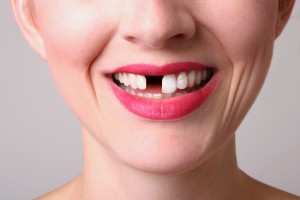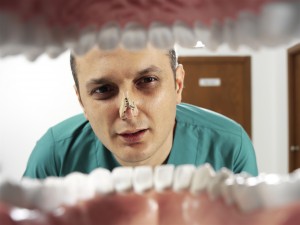WHY DENTAL PROFESSIONALS AT B.I.C
ARE PRO-FLOSSING
THE DEBATE
Food and bacteria which is not cleaned properly from teeth, will lead to plaque, tartar, and oral diseases. This is a well – known fact in dentistry, backed up by research, science and clinical studies. Brushing alone, cleans the front and back surfaces of your teeth, however this is not enough to reach under the gum line and surfaces in-between teeth.
Dental floss is used for just that, to clean around teeth, as well as under the gum line, to remove bacteria from your mouth (in theory). So if flossing cleans food from in-between teeth, this, should mean that flossing should reduce plaque, tartar, and therefore oral diseases as well as brushing. Now why I said “in theory” is because controversially, some clinical experts are going as far to say that flossing is pointless! Erm what? So why is the science and statistics for this so weak?
It may not be currently backed by science but research has found that flossing is beneficial to maintaining good oral health. BUT as with everything, there’s a way and a how. If you don’t do something effectively your are not going to reap the benefits. The problem is…

This is perhaps why the benefits are still divided, especially when some of us are in actual fact damaging our gums through flossing incorrectly, OPS. Dr Bruno Silva, clinical director and principal dentist at the Brighton Implant Clinic advises that “flossing is one of the most important regimes to maintaining good oral health if done correctly. This can successfully reduce, as well as prevent plaque and tartar build-up, where bad bacteria manifests.”
See our full article below on how flossing can reduce your chances of illness, gum disease, halitosis and more! But most importantly HOW TO FLOSS – the right way.
Did you know, that you can buy eco-friendly tooth floss in biodegradable materials such as silk?
REDUCES INFECTION AND ILLNESS

There is evidence to support how bad oral health can have adverse effects on our over all health. The exploration between the two has lead to new studies, which have found that bacteria may be able to enter the bloodstream through the gums. This can have harmful effects on the heart, such as blood clots and cardiovascular infections. There are many links between oral health and our overall health, here’s an article on the link between diabetes and gum disease.
HELPS PREVENT TOOTH DECAY AND GUM DISEASE

Plaque and tartar which is not effectively cleaned from teeth will cause bacteria filled ‘pockets’ around teeth. At a glance, this looks like a hard yellow residue around the bottom of teeth. If this is not treated, the pockets around each tooth will become deeper. This will cause gingivitis, which is an inflammation of the gums. Gingivitis, over time will become more severe causing periodontitis also known as gum disease. Gum disease can cause decay, tissue loss and bone loss, which will eventually cause tooth loss. Did you know that gum disease is the leading cause of tooth loss? Here is our full article on what is gum disease?
HELPS PREVENT BAD BREATH

There are many contributing factors to why people develop bad breath (also known as halitosis) and were not just talking about after you have a coffee. What many people do not know, is that flossing is one of the main factors which can help you prevent bad breath. Bacteria can build up on your tongue, gums and in-between your teeth. People brush the front and back surfaces of their teeth, but it could be the bacteria in-between their teeth which could be fermenting and undesirable stench. This is why flossing as well as brushing, can prevent or eliminate bad breath completely!
If you’re are experiencing regular bad breath, even with brushing and flossing, this could be an underlying condition and you should consult a dentist to check your oral health, you can book with one of our dentist’s today at the Brighton Implant Clinic.
Some common causes of bad breath include:
- Alcohol
- Smoking
- Spicy foods
- Coffee
GETTING FLOSSING RIGHT – THE MOST IMPORTANT BIT
Here are some wise words from Dr Silva from the Brighton Implant Clinic.
The know how:
- There are many different types of dental floss and it is important to find the right one for you. Floss can be waxed/unwaxed, flavoured/unflavoured, ribbon or tape. Commonly, waxed floss is considered easier to slide between the teeth however, your decision should be based on personal preference.
- Half of the battle seems to be adding flossing into our busy schedules. Make flossing part of your everyday routine, choose the most convenient time for you and make it a habit, not a chore.
- Do not cut corners when it comes to flossing – floss one tooth at a time. You need to target all areas around a tooth, meaning, use your forefingers and thumbs to pull dental floss from the gum line to the tooth’s top to scrape the plaque off each tooth as well as flossing each side of your tooth.
- Sometimes we should all be a little bit more frugal, but not with dental floss. You should be using an estimate of 18 inches every time you floss. It is important not to reuse floss sections, as this is likely to transfer bacteria between teeth.
- When flossing your teeth it is important to hold the floss around a single tooth’s front as well as back, forming a “C” shape. To remove food and bacteria effectively, floss gently towards the tooth’s base, as well as just under the gum line. These steps should be repeated for each tooth’s side, which includes the last tooth’s outermost side as well.
FLOSSING WITH DENTAL IMPLANTS
If you have dental implants it is still very important to floss daily around your teeth and gum line. Dental implants must be cared for as if they were your own teeth, in doing so, this will ensure that your dental implants will last. There are different types of dental implant treatments, therefore caring for dental implants is dependable on the fixture you have. For single dental implants, we recommend Tepe Bridge and Implant Floss, with the flossing tips above! With a full upper or lower arch restoration using dental implants, it is advised that you use interdental brushes and an electric flosser also known as a Water Pik. For more information on dental implant treatments or care, visit The Brighton Implant Clinic.
FLOSSING WITH DENTAL BRACES
Maintaining good oral hygiene is essential when having braces. Fitted braces have small spaces! Food particles and bacteria can get trapped in between bands and brackets. This can cause enamel staining as well as tooth decay. Floss teeth daily, making sure to floss properly between brackets as well as underwires.
SUPERFLOSS, super floss is a kind of floss that is specifically designed for braces, bridges, and small to wide spaces! Use this with your braces, bridges and implants to reach difficult areas, available over the counter.
WHEN YOU SHOULD CONSULT A DENTIST
Maintaining good oral hygiene means regular dental check-ups. This is to check, prevent and advise you on your dental health. If you are experiencing any of the symptoms listed below then it is advisable to make an appointment with a dentist.
These are:
- Bleeding gums when flossing or brushing.
- Tender, swollen or red gums.
- Teeth becoming loose.
- Gums that are receding from teeth.
- Changes in alignment of your teeth, including bite.
- Sensitivity to cold and hot
- Unusual taste in the mouth or bad breath.

Information provided to you by the Brighton Implant clinic & advanced dentistry.
The Brighton Implant Clinic was established in 2009, Hove, East Sussex. The award – winning clinic now spans over four sites in Hove, Brighton, Worthing, and Hailsham. Founder and principal dentist Dr Bruno Silva has created a clinic with state of the art facilities and equipment including its own dental laboratory. We provide personalised and affordable dental care, including dental implants and cosmetic dentistry solutions, with additional services such as sedative dentistry. Dr Silva advocates continuous professional development and this is why he has a highly skilled team of dentist, surgeons, and dental nurses. Our welcoming and professional team believe smiling is fundamental, find out how this could change you.

